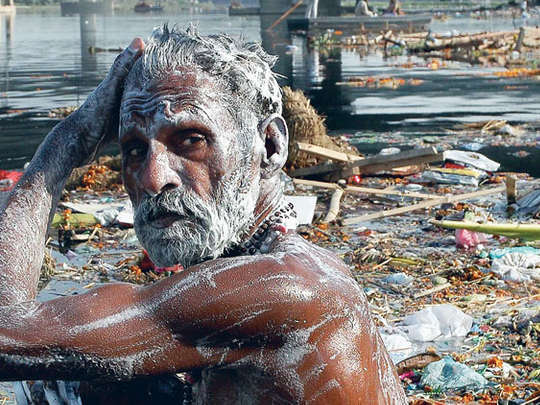
New Delhi: Critics say the Delhi government is still coming up with excuses for the polluted state of the River Yamuna. Which is why even after Rs15b (Dh1.1 billion) it remains as dirty as ever.
A high-powered committee led by lieutenant governor Tejendra Khanna, approved the draft on the constitution of the Yamuna River Development Authority.
The committee reiterated the Yamuna riverbed was a no-construction zone and emphasised the need for river front development and a clean-up. It believes once the civic agency Delhi Jal Board (DJB) completes its interceptor project, pollution levels in the river along the limits of Delhi, will go down to 10mg BOD.
However, Himanshu Thakkar, Director, South Asia Network on Dams, Rivers & People: "The authority was set up at the behest of Prime Minister Manmohan Singh in 2007. We only hear about the meetings, but see no reflection of the work. If the authority has prepared a plan for the ecological well-being of Yamuna, it should share it with the people of Delhi. So far there is no evidence of any functioning."
Even while the government has massive project plans, the DJB's strategy on Interceptor Sewer Network will only partially help clean the river. As a DJB official said: "All it will do is from being very dirty the Yamuna will be less dirty."
Transparent
Thakkar said: "Yes, that's the only purpose. But even that purpose is unlikely to be achieved unless the governance of the DJB and all the components thereof are made transparent, accountable and participatory."
In the past numerous nostalgic soirees were written by Bollywood film lyricists on the rivers, including the Yamuna. But none can sing paeans in its honour over the last few decades.
Even as the river finds few saviours, Chief Minister Sheila Dikshit seems to be at her wits' end due to the growing population and lack of sewerage systems in several areas of the city, essentially the unplanned areas.
She said: "The river cannot be cleaned even with an interceptor sewage system, because in Delhi unauthorised colonies keep cropping up. Several countries were consulted on how they worked with their rivers but we realised that their problems were different from Delhi."
But Sulabh International, which runs public toilets in various Indian cities, still sees hope. A couple of years ago, it developed an ultraviolet water filter (UVWF) that would help clean the river.
Dr Bindeshwar Pathak said the charcoal-based UVWF treats wastewater effluent from biogas plants run on human excreta. The treated water is colourless, odourless and pathogen free.
He said: "Its BOD is even less than 10mg per litre, which is quite safe for nurturing fish and for irrigation and horticultural purposes. Since the treated water does not cause acidity or alkalinity of soil, it helps the growth of microorganisms in soil."
The NGOs and environmentalists have not gone back on their involvement with the river. But it would bode well for citizens to do their bit before grumbling about the role of the civic authorities and the government.
Concern
The chief minister said: "People should have concern for their surroundings. All rivers in the country have a similar predicament. People have to be taught not to throw rubbish in the river."
Indians have a long-standing tradition of washing away their sins in the waters of the country's rivers, which they consider holy.
They not only take baths (using both soap and shampoo) in the rivers, but also throw holy offerings, including marigold flowers, plastic bags and idols into the rivers.
These have not only polluted, but choked the rivers. Thus, despite the Supreme Court orders, the Yamuna is still languishing under the guilt of Delhiites.












